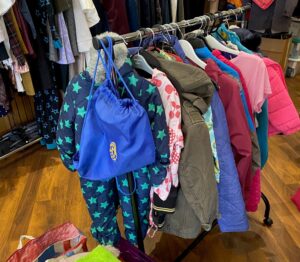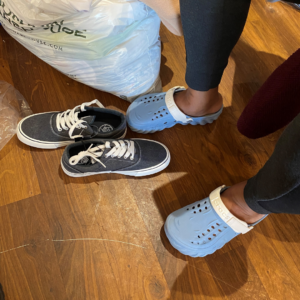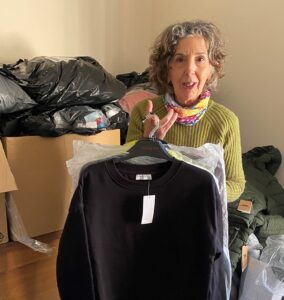“We often need suitcases—they don’t want to carry things in a bin liner—and school bags. Simple things like that.”
Laura runs the ‘Sanctuary Store’, distributing clothes and other essentials in an asylum hotel for families in Yorkshire, with the help of a dedicated team of volunteers.
It’s a chilly morning, and we’re in a large, ground-floor room at the hotel, looking through the clothes and toys which the team have collected from the local area. The families in the hotel come in one at a time to pick out what they need; a little girl with her parents is fascinated by a shiny princess dress.
Prashani, who comes from Sri Lanka, is busy organising and displaying school uniform – she’s staying at the hotel as well as volunteering in the store. “Every day I’m in the room, with three children, it’s very difficult and stressful. When I come down here to help, it’s peaceful, it changes my mood, I feel more motivated,” she explains.
Back home, she was a nurse, and volunteering reminds her of this. “At that time I cared for patients, so now I can help here, it’s better for me.” She says she’d like to work in the NHS, when she’s passed an exam.
It is about helping to restore their dignity.
“We try and run this in a relaxed environment, so that people can make a connection, and be known by name,” explains Laura, who is a hotel support worker at the Refugee Council. “Often people arrive in a state of trauma.”
“It is about helping to restore their dignity. People are so stripped of individuality in the hotel… So it’s important we try to get to know them a bit.”

M., who is also from Sri Lanka, has been volunteering in this hotel for four months. “It makes me happy inside,” she says. “When I came to this country, we were in a hotel… I want to show my gratitude to Laura and this country. We came here with nothing.”
She says that the conversations they have are just as important as providing the basics. “People feel so comforted by expressing their feelings… They had to leave everything when they come here, they feel like failures when they come here, but they get help in the Sanctuary Store. It brings hope and it’s good for mental health. From my side, also, it’s the same.”
N. is from Afghanistan and is here with his wife. “We came by boat, it was so tough. The situation is Afghanistan is not good, especially for women,” he says. “It’s the control of the Taliban, truly.” He’s been in the hotel for seven months. “People think we’re living a good life, but mentally it’s disturbing.”

C. is picking up some shoes for herself and some school uniform for her daughter. “You people are doing a wonderful job,” she says. Laura is trying to find a keyboard for her son, who is musical. C. says she’d like to start volunteering herself, once both her children are in school. But for now, she’s still in shock. “Whenever I look at my children I start crying. It’s very tough, I can’t imagine myself, living a life I never dreamed of,” she says.
On one of the tables with craft activities, Amina* is making a sweater. “I’m a bit stressed,” she says, speaking in Kurdish. “I’ve been here 11 months, sometimes I think they’re going to transfer me, but they haven’t yet.”
It got me thinking—what can I do to help?
Mel is a retired nurse, and started volunteering for the Refugee Council after a group of children from the hotel asked her directions to the local primary school. “They immediately walked off in the wrong direction!” she remembers. “It got me thinking—what can I do to help?”
“The hard thing is not knowing when people will get moved on, often they don’t get to say goodbye,” she says. And for the families themselves, this state of constant uncertainty is destructive—the children will have to change schools and abandon new friendships with very little notice.

While we are talking, a steady stream of people come in to find the things they need, and stay for a chat. By the end of this session, Mel is delighted. “I could dance up the high street,” she says. “The coats we had have gone onto people’s backs, so people will be warm in this weather. It’s a good feeling. New pants are so important, it’s so nice to have suitable ladies’ underwear, to be able to discreetly pass this on, to people who really don’t want to ask.”
The hotel is stark reminder of some of the reasons people are forced to claim asylum—the families here have lived through terrible experiences. Speaking with them shows how badly we need a fair and humane asylum system, so that they can recover and rebuild their lives, with a chance to work and care for their kids like anyone else.
With the news agenda so often filled with hostile headlines, it’s inspiring to see how local people are stepping in to welcome these families to their area, and how fast, given half a chance, these parents and children can become a valued part of their new communities.
If you can, please help us welcome and support refugees to the UK by making a donation.

